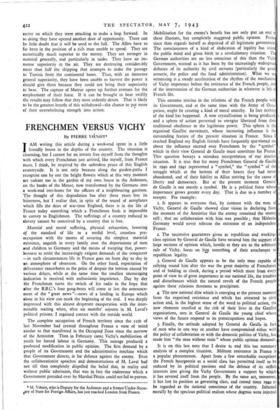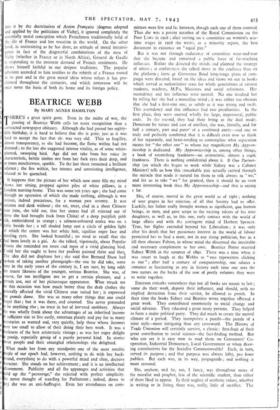FRENCHMEN VERSUS VICHY
By PIERRE Vli.'NOT-*
Material and moral suffering, physical exhaustion, lowering of the standard of life to a sordid level, ceaseless pre- occupation with the means of assuring the simplest material existence, anguish in every family over the deportations of men and children to Germany and the means of escaping that, power- lessness to resist the increasingly exigent demands of the conqueror —in such circumstances life in France goes on from day to day in an atmosphere of obsession. On the other hand, expectation of deliverance exacerbates to the point of despair the tension caused by various delays, while at the same time the smallest encouraging indication is received with enthusiastic impatience. Day by day the Frenchman turns the switch of his radio in the hope that after the B.B.C.'s four gong-beats will come at last the announce- ment of the " great news "—news of a landing in Europe which alone in his view can mark the beginning of the end. I was deeply impressed with this almost desperate exasperation with the inter- minable waiting when, after six months' sojourn in M. Laval's political prisons, I regained contact with the outside world.
The complete occupation of French territory since the 11th of last November had created throughout France a state of mind similar to that manifested in the Occupied Zone since the morrow of the Armistice. Then in February came Vichy's mobilisation of youth for forced labour in Germany. This outrage produced a profound modification in public opinion. The first demand by a people of its Government and the administrative machine which that Government directs, is for defence against the enemy. Even the collaborationist speeches and demonstrations of M. Laval had not till then completely dispelled the belief that, in reality and without public admission, that was in fact the endeavour which a Government presided over by Marshal Petain could not fail to pursue.
• M. Vienot, who is Deputy for the Ardennes and a former Under-Secre- tary of State for Foreign Affairs, has just reached London from France.
Mobilisation for the enemy's benefit has not only put an end t these illusions, but completely staggered public opinion. Franc since then regards herself as deprived of all legitimate governmen The consciousness of a kind of abdication of legality has seize the public mind and given birth to a revolutionary situation. Th German authorities are no less conscious of this than the Vich Government, warned as it has been by the increasingly widesprea defiance of its authority by civil servants (particularly the gend armerie, the police and the food administration). What we ar witnessing is a steady acceleration of the rhythm of the mechanic of Vichy impotence before the resistance of the French people, an of the intervention of the German authorities in whatever is left o French life.
This extreme tension in the relations of the French people with its Government, and at the same time with the Army of Occu- pation, might be creating a kind of moral anarchy. In fact nothing of the kind has happened. A new crystallisation is being produced, and a sphere of action presented to energies liberated from their traditional obedience to the legitimate power. This sphere is the organised Gaullist movement, whose increasing influence is the outstanding feature of the present situation in France. Since I reached England my English friends have frequently questioned me about the influence exerted over Frenchmen by the " symbol" ( which in their view General de Gaulle must constitute for France. This question betrays a mistaken interpretation of our interior ( situation. It is true that for many Frenchmen General de Gaulle in 5940 and 1941 represented a " symbol," the " symbol " of the s struggle which at the bottom of their hearts they had never r abandoned, and of their fidelity to Allies striving for the cause of liberty and democracy. But at the present moment General de Gaulle is not merely a symbol. He is a political force whose importance grows greater every day. That is due to a number of reasons. For example : 1. It appears to everyone that, by contrast with the men of a Vichy, General de Gaulle showed clear vision in declaring from the moment of the Armistice that the enemy remained the enemy tl still ; that no collaboration with him was possible ; that Hitlerite si Germany would never tolerate the existence of an independent France.
2. The successive guarantees given to republican and working- class opinion by General de Gaulle have secured him the support of large sections of opinion which, hostile as they are to the arbitrary rule of Vichy, focus on him something of their attachment to republican legality.
3. General de Gaulle appears to be the only man capable of rallying round him after the war the great majority of Frenchmen and of holding in check, during a period which must from every point of view be of great importance in our national life, the troubles and disturbances which the natural revolt of the French people against these relations threatens to precipitate.
4. The new national elite which is emerging at the present moment from the organised resistance and which has attracted to civic action and, in the highest sense of the word to political action, the new elements enrolled at the risk of their lives in the Gaullist organisations, sees in General de Gaulle the young chief whose views of the future respond to its preoccupations and hopes.
5. Finally, the attitude adopted by General de Gaulle in face of men who in one way or another have compromised either with the policy of collaboration or with the domestic politics of Vichy, has made him " the man without stain " whom public opinion demands.
It is on this last note that I desire to end this too summary analysis of a complex situation. Militant resistance in France is a popular phenomenon. Apart from a few remarkable exceptions the French bourgeoisie as a social class has permitted itself to be seduced by its political passions and the defence of its selfish interests into giving the Vichy Government a support by which it has severed itself from the people. By the same act, moreover, it has lost its position as governing class, and ceased since 1940 to be regarded as the national conscience of the country. Infected morally by the specious political realism whose dogmas were injected
into it by the doctrinaires of Action Francaise (dogmas adopted and applied by the politicians of Vichy), it ignored completely the essentially moral conception which Frenchmen traditionally hold of the life of France and her vocation in the world. On the other hand, in maintaining as he has done, an attitude of moral intransi- gence in face of the disgraceful combinations of the men of Vichy (whether in France or in North Africa), General de Gaulle is responding, to the insistent demand of French sentiments. He shows himself faithful to our deepest traditions. The popular adhesion accorded to him testifies to the rebirth of a France rooted in its past and in the great moral -ideas whose values it has pro- claimed throughout the centuries, and which tomorrow will be once more the basis of both its home and its foreign policy.



























 Previous page
Previous page